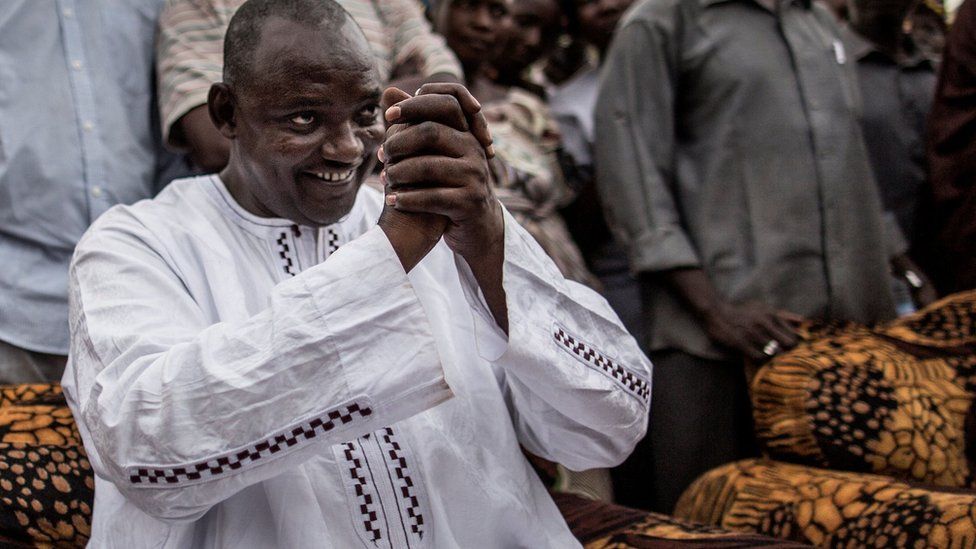Gambia elections: President-elect Adama Barrow's life story
- Published

Adama Barrow, a successful property developer who has never held public office, has defied the odds to score a shock victory in The Gambia's elections.
His victory in the small West African nation's presidential poll is arguably an even bigger shock than that of fellow property mogul in the US, Donald Trump.
Mr Barrow's opponent Yahya Jammeh, has ruled the country for more than two decades, but said if God willed it, his presidency could go on for "a billion years".
Before the 51-year-old was chosen in September as the candidate to represent seven Gambian opposition parties at the election, he had spent 10 years working in property, having started his own estate agency in 2006.
In the early 2000s, he lived in the UK for several years, where he reportedly worked as a security guard at the Argos catalogue store in north London, while studying for his real estate qualifications.
British media have even reported that while guarding the shop on Holloway Road, he made a citizen's arrest on a shoplifter, which resulted in a six-month jail term.
It was also during that period that Mr Barrow chose to support Arsenal FC, at that time his local club.
Despite the uncertainty over whether the disputed election, he recently shared a picture on Twitter of him wearing the north London club's jersey and declared support for the team:
"You can change your politics, but never can you change your favourite football team! Thank you — @Arsenal! #Gambia #Arsenal"
He was born in 1965, the same year his country gained independence from British colonial rule, in a small village near the market town of Basse in the east of the country.
Throughout his campaign, he pledged support for an independent judiciary, as well as increased freedom for the media and civil society.
Six things about Adama Barrow:
- Member of the Fula ethnic group, born in 1965, the year of Gambian independence
- Reportedly worked as a security guard at Argos in the early 2000s while studying in UK
- Returned home in 2006 to set up property business
- Supports English Premier League football team Arsenal
- Nominated as the candidate for coalition of seven opposition parties, promising greater respect for human rights
- A devout Muslim who is reportedly married with two wives and five children
He described his opponent as a "soulless dictator" and promised to undo some of Mr Jammeh's more controversial moves.
"We will take the country back to the Commonwealth and the International Criminal Court (ICC)," he said.
A devout Muslim, he also criticised the lack of a two-term limit on the presidency and condemned the jailing of political opposition figures.
Speaking to the BBC three days before the election, Mr Barrow said that Gambians "had been suffering for 22 years" and were ready for change.
He scorned the achievements of his opponent, who boasted of having brought The Gambia out of the stone age with his education and health programmes.
More on President Jammeh's rule:
The hospitals President Jammeh had built had "no drugs... or quality doctors", the schools "no teachers, no chairs... no good educational materials", he said.
They were "white elephant projects".
Although he became treasurer of the main opposition United Democratic Party (UDP) party in 2013, Mr Barrow was not a household name in The Gambia. He was described as "little-known" even by one of the local media outlets supporting him.
In an interview with a local media, Mai Ceesay, a former female UDP youth leader, describes Mr Barrow as industrious and humble, calling him the perfect candidate:
"He is humble, kind and industrious man who breaks the deal. He is down to the earth," she said.
In his media appearances, Mr Barrow comes across as laid back, almost guarded, but his infectious smile gives him a personable mien.
But he is not a rousing speaker.
His accidental rise came after the jailing of UDP leader Ousainou Darboe, a long time nemesis of Mr Jammeh, who was detained months before the 1 December election after leading a protest over the alleged death of an activist in police custody.
Mr Darboe's absence may have forced the opposition parties to rally behind one candidate. He was freed on bail after the opposition won the election.
Mr Barrow, has two wives and five children, according to the Gambian newspaper The Point.
He was especially popular among young voters who have been badly hit by the country's struggling economy.
On 15 January 2017, his eight-year-old son Habibu Barrow died reportedly after being bitten by a dog.
Mr Barrow missed his son's funeral as he was advised to remain in Senegal for his safety ahead of his inauguration - held in his country's embassy in Dakar, Senegal, on 19 January.
Many thousands of Gambians have made the perilous journey to Europe in search of jobs.
So The Gambia's new leader has great expectations on his shoulders - as he makes history in a country which has not had a smooth transfer of power in his lifetime.
But he has to return home, first.
Mr Jammeh has refused to stand down. Senegalese troops have entered The Gambia to enforce the result of the election - and the UN has backed their efforts.
- Published21 October 2016
- Published22 January 2017
- Published29 November 2011
- Published12 April 2023
- Published7 September 2010